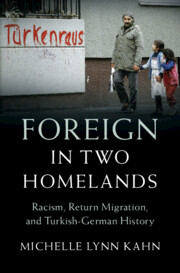Foreign in Two Homelands
What happens when migrants are rejected by the host society that first invited them? How do they return to a homeland that considers them outsiders? Foreign in Two Homelands explores the transnational history of Turkish migrants, Germany’s largest ethnic minority, who arrived as “guest workers” (Gastarbeiter) between 1961 and 1973. By the 1980s, amid rising racism, neo-Nazis and ordinary Germans blamed Turks for unemployment, criticized their Muslim faith, and argued they could never integrate. In 1983, policymakers enacted a controversial law: paying Turks to leave. Thus commenced one of modern Europe’s largest and fastest waves of remigration: within one year, 15 percent of the migrants – 250,000 men, women, and children – returned to Turkey. Their homeland, however, ostracized them as culturally estranged “Germanized Turks” (Almancı). Through archival research and oral history interviews in both countries and languages, Michelle Lynn Kahn highlights migrants’ personal stories and reveals how many felt foreign in two homelands. This title is also available as Open Access on Cambridge Core.
Michelle Lynn Kahn is Associate Professor of Modern European History at the University of Richmond. Her research examines post-1945 Germany and Europe in a global and transnational frame, focusing on migration, racism, far-right extremism, gender, and sexuality. She was awarded the 2019 Fritz Stern Dissertation Prize of the German Historical Institute and the 2022 Chester Penn Higby Prize of the American Historical Association.



